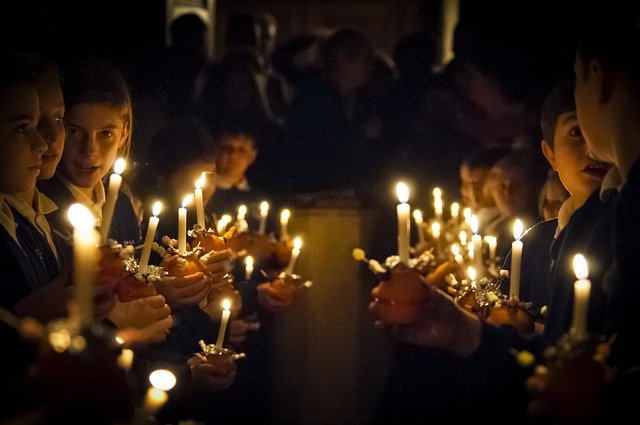As I already mentioned in my article on how to say merry Christmas and a happy new year In German, Germans are very fond of Christmas. And so they have been for many centuries. So it’s no wonder German composers have written a great number of beautiful Christmas carols, especially in the 19th century. The 17th and 18th century had seen many horrible wars in Europe and people were longing for peace and and a feeling of comfort in their own homes. So Christmas with its message of peace and joy gained much popularity. In this article we are giving you the lyrics of the most popular German Christmas songs with translations.
The translations are literal, so they will probably differ from the English versions you are accustomed to. Their purpose is to give you a better understanding of the original German lyrics. They are not meant to be sung as such. If you would like to sing an English version of these beautiful songs, it shouldn’t be hard to find the lyrics on the web.
Table of Contents
- Solemn German Christmas Songs with Lyrics
- Stille Nacht, Heilige Nacht – Silent Night, Holy Night
- Leise rieselt der Schnee – Snow Falls Softly at Night
- O du fröhliche – Oh you joyful
- Ihr Kinderlein kommet – O Come Little Children
- Vom Himmel hoch, da komm ich her – From Heaven Above to Earth I Come
- Macht hoch die Tür, die Tor macht weit – Lift up your heads, ye mighty gates
- German Christmas Songs for Children
- Austrian Christmas Songs
Solemn German Christmas Songs with Lyrics
Stille Nacht, Heilige Nacht – Silent Night, Holy Night
Composed by Franz Xaver Gruber and with lyrics by Joseph Mohr, it was first performed on Christmas Eve 1818 in a small chapel in Oberndorf, Austria. It has been translated into 140 languages and was declared an intangible cultural heritage by the UNESCO in 2011. The original version has six verses, but we give you the more commonly used form with three verses.
Stille Nacht, Heilige Nacht is probably the most popular German Christmas carol worldwide.
Lyrics: Stille Nacht, heilige Nacht
Franz Xaver Gruber / Joseph Mohr, 1818
Stille Nacht, heilige Nacht!
Alles schläft, einsam wacht
nur das traute, hochheilige Paar.
Holder Knabe im lockigen Haar,
schlaf in himmlischer Ruh,
schlaf in himmlischer Ruh.
Stille Nacht, heilige Nacht!
Hirten erst kundgemacht,
durch der Engel Halleluja
tönt es laut von fern und nah:
Christ, der Retter, ist da,
Christ, der Retter, ist da!
Stille Nacht, heilige Nacht!
Gottes Sohn, o wie lacht
Lieb aus deinem göttlichen Mund,
da uns schlägt die rettende Stund,
Christ, in deiner Geburt,
Christ, in deiner Geburt.
Translation: Silent night, holy night, All is asleep; lonely awake Only the holy couple. Sweet boy in curly hair, Sleep in heavenly peace! Sleep in heavenly peace! Silent night, holy night, Shepherds first announced By the angels' hallelujah, It sounds loud from far and near: Christ, the Savior is here! Christ, the Savior is here! Silent night, holy night, Son of God, o how laughs Love from your divine mouth, As the hour of our salvation beats. Christ, in thy birth! Christ, in thy birth!
Leise rieselt der Schnee – Snow Falls Softly at Night
Written by the protestant pastor Eduard Ebel in 1895, this is one of the most loved German Christmas songs.
Lyrics: Leise rieselt der Schnee
Eduard Ebel, 1895
Leise rieselt der Schnee,
Still und starr liegt der See,
Weihnachtlich glänzet der Wald:
Freue Dich, Christkind kommt bald.
In den Herzen ist’s warm,
Still schweigt Kummer und Harm,
Sorge des Lebens verhallt:
Freue Dich, Christkind kommt bald.
Bald ist heilige Nacht;
Chor der Engel erwacht;
Horch’ nur, wie lieblich es schallt:
Freue Dich, Christkind kommt bald
Translation: Silently falls the snow, Still and rigid lies the lake, Christmas shines in the forest: Rejoice, Christ Child is coming soon. In the hearts it is warm, Silent is sorrow and harm, Life's sorrows fade away: Rejoice, Christ Child is coming soon. Soon is holy night; Choir of angels awakes; Just listen, how sweetly it resounds: Rejoice, Christ Child is coming soon
O du fröhliche – Oh you joyful
Written originally as “Song for the three holidays” (Christmas, Easter and Whitsunday/Pentecost) in 1815 by Johannes Daniel Falk, the director of an orphanage in Weimar. One of his assistants rewrote the song 11 years later and turned it into a pure Christmas carol. The melody stems from a folk song from Sicily.
O du fröhliche, o du selige,
Johannes Daniel Falk 1815, Heinrich Holzschuher 1826
gnadenbringende Weihnachtszeit!
Welt ging verloren, Christ ist geboren:
Freue, freue dich, o Christenheit!
O du fröhliche, o du selige,
gnadenbringende Weihnachtszeit!
Christ ist erschienen, uns zu versühnen:
Freue, freue dich, o Christenheit!
O du fröhliche, o du selige,
gnadenbringende Weihnachtszeit!
Himmlische Heere jauchzen Dir Ehre:
Freue, freue dich, o Christenheit!
Translation: O you joyful, O you blessed, mercy-bringing Christmas time! The world was lost, Christ was born: Rejoice, rejoice, O Christianity! O you joyful, O you blessed, mercy-bringing Christmas time! Christ has appeared to make atonement for us: Rejoice, rejoice, O Christendom! O you joyful, O you blessed, mercy-bringing Christmas time! Heavenly armies shout glory to Thee: Rejoice, rejoice, O Christendom!
Ihr Kinderlein kommet – O Come Little Children
Written around 1810 by the roman-catholic priest Christoph von Schmid, who wrote many songs and books for children. But this carol is his most loved piece of German Christmas music.
Lyrics: Ihr Kinderlein kommet
Christoph von Schmid 1810
Ihr Kinderlein, kommet, o kommet doch all!
Zur Krippe her kommet in Betlehems Stall
und seht, was in dieser hochheiligen Nacht
der Vater im Himmel für Freude uns macht!
O seht in der Krippe, im nächtlichen Stall,
seht hier bei des Lichtleins hellglänzendem Strahl,
den lieblichen Knaben, das himmlische Kind,
viel schöner und holder, als Engelein sind.
Da liegt es, das Kindlein, auf Heu und auf Stroh,
Maria und Josef betrachten es froh;
die redlichen Hirten knien betend davor,
hoch oben schwebt jubelnd der Engelein Chor.
Manch Hirtenkind trägt wohl mit freudigem Sinn
Milch, Butter und Honig nach Betlehem hin;
ein Körblein voll Früchte, das purpurrot glänzt,
ein schneeweißes Lämmchen mit Blumen bekränzt.
O betet: Du liebes, Du göttliches Kind
was leidest Du alles für unsere Sünd’!
Ach hier in der Krippe schon Armut und Not,
am Kreuze dort gar noch den bitteren Tod.
O beugt wie die Hirten anbetend die Knie,
erhebet die Hände und danket wie sie!
Stimmt freudig, ihr Kinder – wer wollt sich nicht freun? –
stimmt freudig zum Jubel der Engel mit ein!
Was geben wir Kinder, was schenken wir Dir,
du Bestes und Liebstes der Kinder, dafür?
Nichts willst Du von Schätzen und Freuden der Welt –
ein Herz nur voll Unschuld allein Dir gefällt.
So nimm unsre Herzen zum Opfer denn hin;
wir geben sie gerne mit fröhlichem Sinn –
und mache sie heilig und selig wie Dein’s,
und mach sie auf ewig mit Deinem nur Eins.
Translation: Little children, come, O come all! Come to the manger in Bethlehem's stable and see, what in this most holy night the Father in heaven gives us for joy! O see in the manger, in the nightly stable, See here, by the light's bright shining beam, the lovely boy, the heavenly child, Much more beautiful and more lovely than angels are. There it lies, the child, on hay and on straw, Mary and Joseph look at him joyfully; the honest shepherds kneel praying before it, high above floats rejoicing the angels choir. Many a shepherd child carries with a joyful mind milk, butter and honey to Bethlehem; a basket full of fruit, shining crimson, A snow-white lamb with flowers crowned. O pray: You dear, you divine child how much you suffer for our sins! Oh here in the manger already poverty and misery, On the cross there even the bitter death. O bow your knees in adoration like the shepherds, Lift up your hands and give thanks like them. Rejoice, you children - who does not want to rejoice? - – joyfully join in the cheer of the angels! What do we children give, what do we give to you, you best and dearest of children, in return? Nothing do you want from treasures and joys of the world - A heart full of innocence alone pleases Thee. So take our hearts for sacrifice then; we give them gladly with a joyful mind - And make them holy and blessed like Thine, And make them eternally one with Thine only.
Vom Himmel hoch, da komm ich her – From Heaven Above to Earth I Come
Probably one of the oldest German Christmas songs still sung today, written by Martin Luther in 1534. The original has 15 verses, but nowadays it is more common to sing only the first three or four.
Lyrics: Vom Himmel hoch, da komm ich her
Martin Luther, 1534
Vom Himmel hoch, da komm ich her.
Ich bring’ euch gute neue Mär,
Der guten Mär bring ich so viel,
Davon ich sing’n und sagen will.
Euch ist ein Kindlein heut’ geborn
Von einer Jungfrau auserkorn,
Ein Kindelein, so zart und fein,
Das soll eu’r Freud und Wonne sein.
Es ist der Herr Christ, unser Gott,
Der will euch führn aus aller Not,
Er will eu’r Heiland selber sein,
Von allen Sünden machen rein.
Er bringt euch alle Seligkeit,
Die Gott der Vater hat bereit,
Daß ihr mit uns im Himmelreich
Sollt leben nun und ewiglich.
Translation: From Heaven Above to Earth I Come. I bring you good new tales, I bring so many good tales That I will sing and tell. A little child is born to you today Born of a virgin, A child so tender and fine, That shall be your joy and delight. It is the Lord Christ, our God, Who will lead you out of all distress, He will be your Savior himself, To cleanse you from all sins. He brings you all bliss, Which God the Father has prepared, That ye with us in the kingdom of heaven May you live now and forever.
Macht hoch die Tür, die Tor macht weit – Lift up your heads, ye mighty gates
Another one of the older German Christmas songs, this one was written in 1623 by the Lutheran minister Georg Weissel.
Lyrics: Macht hoch die Tür, die Tor macht weit
Georg Weissel, 1623
Macht hoch die Tür, die Tor macht weit;
es kommt der Herr der Herrlichkeit,
ein König aller Königreich,
ein Heiland aller Welt zugleich,
der Heil und Leben mit sich bringt;
derhalben jauchzt, mit Freuden singt:
Gelobet sei mein Gott,
mein Schöpfer reich von Rat.
Er ist gerecht, ein Helfer wert;
Sanftmütigkeit ist sein Gefährt,
sein Königskron ist Heiligkeit,
sein Zepter ist Barmherzigkeit;
all unsre Not zum End er bringt,
derhalben jauchzt, mit Freuden singt:
Gelobet sei mein Gott,
mein Heiland groß von Tat.
O wohl dem Land, o wohl der Stadt,
so diesen König bei sich hat.
Wohl allen Herzen insgemein,
da dieser König ziehet ein.
Er ist die rechte Freudensonn,
bringt mit sich lauter Freud und Wonn.
Gelobet sei mein Gott,
mein Tröster früh und spat.
Macht hoch die Tür, die Tor macht weit,
eu’r Herz zum Tempel zubereit’.
Die Zweiglein der Gottseligkeit
steckt auf mit Andacht, Lust und Freud;
so kommt der König auch zu euch,
ja, Heil und Leben mit zugleich.
Gelobet sei mein Gott,
voll Rat, voll Tat, voll Gnad.
Komm, o mein Heiland Jesu Christ,
meins Herzens Tür dir offen ist.
Ach zieh mit deiner Gnade ein;
dein Freundlichkeit auch uns erschein.
Dein Heilger Geist uns führ und leit
den Weg zur ewgen Seligkeit.
Dem Namen dein, o Herr,
sei ewig Preis und Ehr.
Translation: Open wide the door, open wide the gates; the Lord of Glory is coming, a king of all kingdoms, a Savior of all the earth at once, who brings with him salvation and life; therefore rejoice, sing with joy: Praise be to my God, my Creator rich in counsel. He is just, worthy of help; meekness is his vehicle, his royal crown is holiness, His scepter is mercy; He brings all our troubles to an end, therefore rejoice, sing with joy: Praised be my God, my Savior great in deed. O blessed is the land, O blessed is the city, That has this king with it. Good to all hearts in general, When this king comes. He is the true sun of joy, Bringing with him joy and gladness. Praise be to my God, My comforter in time past and present. Open wide the door, open wide the gates, Prepare your heart for the temple. The branches of godliness With devotion, joy and gladness; Then the king will come to you, Yea, salvation and life withal. Praise be to my God, Full of counsel, full of action, full of grace. Come, O my Savior Jesus Christ, The door of my heart is open to thee. Oh enter with your grace; Thy kindness also appear to us. Thy Holy Spirit lead and guide us the way to eternal bliss. To thy name, O Lord, Eternal praise and honor be to thy name, O Lord.
German Christmas Songs for Children

The following Christmas carols aren’t necessarily for children only. But as they are less solemn and more cheerful, they are usually preferred by the kids.
Kling, Glöckchen, klingelingeling – Ring, little bell, ringalingaling
Written by the German teacher Karl Enslin and published in 1854. It describes how the Christ Child asks to be let into the warm house on the cold Christmas Eve.
Lyrics: Kling, Glöckchen, klingelingeling
Kling, Glöckchen, klingelingeling,
kling, Glöckchen, kling!
Lasst mich ein, ihr Kinder,
ist so kalt der Winter,
öffnet mir die Türen,
lasst mich nicht erfrieren!
Kling, Glöckchen, klingelingeling,
kling, Glöckchen, kling!
Kling, Glöckchen, klingelingeling,
kling, Glöckchen, kling!
Mädchen, hört, und Bübchen,
macht mir auf das Stübchen!
Bring euch viele Gaben,
sollt euch dran erlaben.
Kling, Glöckchen, klingelingeling,
kling, Glöckchen, kling!
Kling, Glöckchen, klingelingeling,
kling, Glöckchen, kling!
Hell erglühn die Kerzen,
öffnet mir die Herzen!
Will drin wohnen fröhlich,
frommes Kind, wie selig.
Kling, Glöckchen, klingelingeling,
kling, Glöckchen, kling!
Translation: Ring, little bell, ringalingaling, Ring, little bell, ring! Let me in, you children, If the winter is so cold, Open the doors for me, don't let me freeze to death! Ring, little bell, ringalingaling, Ring, little bell, ring! Ring, little bell, ringalingaling, Ring, little bell, ring! Girls, listen, and boys, Open the parlor for me! I Bring you many gifts, You shall enjoy them. Ring, little bell, ringalingaling, Ring, little bell, ring! Ring, little bell, ringalingaling, Ring, little bell, ring! Brightly glow the candles, Open up your hearts to me! I want to live happily inside, Devout child, how blessed. Ring, little bell, ringalingaling, Ring, little bell, ring!
O Tannenbaum – O Christmas Tree
The melody for this song developed as early as the 16th century. In 1819 August Zarnack wrote the original lyrics as a tragic love song in which the fir tree stood in contrast to an unfaithful lover. In 1824 the teacher Ernst Anschütz rewrote the lyrics as a Christmas carol.
O Tannenbaum, o Tannenbaum,
E. Anschütz / A. Zarnack, 1824
wie treu sind deine Blätter!
Du grünst nicht nur zur Sommerzeit,
nein, auch im Winter, wenn es schneit.
O Tannenbaum, o Tannenbaum,
wie treu sind deine Blätter!
O Tannenbaum, o Tannenbaum,
du kannst mir sehr gefallen.
Wie oft hat nicht zur Weihnachstzeit
ein Baum von Dir mich hoch erfreut!
O Tannenbaum, o Tannenbaum,
du kannst mir sehr gefallen!
O Tannenbaum, o Tannenbaum,
dein Kleid will mich was lehren:
Die Hoffnung und Beständigkeit
gibt Kraft und Trost zu jeder Zeit.
O Tannenbaum, o Tannenbaum,
dein Kleid will mich was lehren.
Translation: (Tannenbaum translates as fir tree, but in this case means the Christmas tree) O Christmas tree, O Christmas tree, how faithful are your leaves! You are green not only in summertime, No, even in winter when it snows. O Christmas tree, O Christmas tree, How faithful are your leaves! O Christmas tree, O Christmas tree, You can please me very much. How often at Christmas time a tree from you has delighted me! O Christmas tree, O Christmas tree, You can please me very much! O Christmas tree, O Christmas tree, Your dress will teach me something: The hope and constancy Give strength and comfort at all times. O Christmas tree, O Christmas tree, Your dress will teach me something.
Morgen kommt der Weihnachtsmann – Tomorrow Santa Claus comes
We are giving you the original version written in 1835 by the German poet Hoffmann von Fallersleben. The napoleonic wars had ended just 20 years before and Germany was on its way to become a strong and united nation again. These historic circumstances explain why the child in the song wants mainly tin soldiers and toy guns as presents from Santa Clause. These days the kids usually sing a more modern version (like in the video) in which they wish for a train set and other more civil toys. Which of course suits our idea of a peaceful Christmas better.
Hoffmann von Fallersleben wrote a number of other songs for children, which are still popular today. But he is most famous for his lyrics of the German national anthem. Considering the nationalist overtones of his Christmas song, it is rather ironic that the melody is based on a French folk song from the 18th century, “Ah ! Vous dirai-je maman”. British and American readers will know the song under another name, “Twinkle, twinkle, little Star!”
Morgen kommt der Weihnachtsmann,
Hoffmann von Fallersleben, 1835
kommt mit seinen Gaben.
Trommel, Pfeife und Gewehr,
Fahn und Säbel und noch mehr.
Ja ein ganzes Kriegesheer,
Möcht’ ich gerne haben.
Bring’ uns, lieber Weihnachtsmann,
bring’ auch morgen, bringe
Musketier und Grenadier,
Zottelbär und Panthertier,
Roß und Esel, Schaf und Stier,
lauter schöne Dinge.
Doch du weißt ja unsern Wunsch,
kennest unsere Herzen.
Kinder, Vater und Mama,
auch sogar der Großpapa.
Alle, alle sind wir da,
warten dein mit Schmerzen.
Translation: Tomorrow Santa Claus comes, comes with his gifts. Drum, whistle and gun, banner and saber and more. Yes, a whole army of war, I'd like to have. Bring us, dear Santa Claus, bring tomorrow, bring Musketeer and grenadier, Shaggy bear and panther beast, horse and donkey, sheep and bull, All beautiful things. But you know our wish, know our hearts. Children, father and mother, even grandpapa. All, all we are there, Waiting for you with pain.
Austrian Christmas Songs
Es wird scho glei dumpa – It will be dark soon
The lyrics for this Austrian Christmas carol were published by an Austrian priest in 1884. The melody is much older and first appeared in a hymn-book at the end of the 17th century.
Be warned, though. The lyrics are in a strong Austrian/Tyrolean dialect, so you’ll have difficulties understanding it. Even most Germans are struggling with it, so don’t worry. But the beautiful melody and the soft singing made the song quite popular in Germany as well.
Es wird scho glei dumpa
Anton Reiniger 1884
Es wird scho glei dumpa, es wird scho glei Nacht,
drum kimm i zu dir her, mein Heiland, auf d’Wacht.
Will singan a Liadl dem Liabling, dem kloan,
du magst ja net schlafn, i hör’ di nur woan.
Hei hei, hei hei! Schlaf süaß, herzliabs Kind!
Vergiß jetzt, o Kinderl, dein Kumma, dei Load,
dass du da muasst leid’n im Stall auf da Hoad.
Es ziern ja die Engerl dei Liegestatt aus,
möcht schöner net sein drin in König sein Haus.
Hei hei, hei hei! Schlaf süaß, du liabs Kind!
Ja Kinderl, du bist halt im Kripperl so schön,
mi ziemt, i kann nimmer da weg von dir gehn.
I wünsch dir von Herzen die süaßeste Ruah,
die Engerl vom Himmel, die decken di zua.
Hei hei, hei hei! Schlaf süaß, du schöns Kind!
Mach zu deine Äugerl in Ruah und in Fried
und gib ma zum Abschied dein Segn nur grad mit.
Aft wird a mein Schlaferl a sorgenlos sein,
aft kann i mi ruahli aufs Niederleg’n freu’n.
Hei hei, hei hei! Schlaf süaß, mein liabs Kind!
Translation: It will be dark soon It's already getting dark, it's already getting night, So I'm coming to you, my Savior on guard. We sing a song to the little child, the little one. You may not sleep, I only hear you cry. Ei, ei, ei, sleep sweetly, dear child. Forget now, o little child, your sorrow, your suffering, That you must suffer in the stable on the heath. The angels adorn your crib, Would not be more beautiful in the noblest house. Ei, ei, ei, sleep sweetly, dear child. O child, you lie there in the crib so beautiful; It seems to me I can never leave you there. I wish you the sweetest rest from my heart; The angels from heaven, they tuck you in. Ei, ei, ei, sleep sweetly, you beautiful child. Close your little eyes in peace and quiet And give me your blessing when you leave. Then my sleep will be quite carefree, Then I can look forward to lying down. Ei, ei, ei, sleep sweetly, dear child.
Andachtsjodler – Devotion Yodel
Now, when you think of yodeling, you might imagine a cowboy driving his herd of cattle across the prairie. And in the region of the German, Austrian and Swiss Alps, yodeling probably developed as some form of communication over long distances or from mountain to mountain. But it is more complex than just yelling, as yodeling consists of constant switches between the low chest voice and the high-pitch head voice.
And it doesn’t have to be loud and fast either. It can also be performed very calm and tender, as you can see in this video with Austrian neo folk singer Zabine. No lyrics here, of course, as these aren’t meaningful words, but simply sounds. Not really a Christmas song either, but it fits the spirit of a holy night very well.
OK, we hope you enjoyed our little collection of traditional German Christmas songs.
Languageholic wishes all our readers (no matter if christian or not) a merry and peaceful Christmas!



